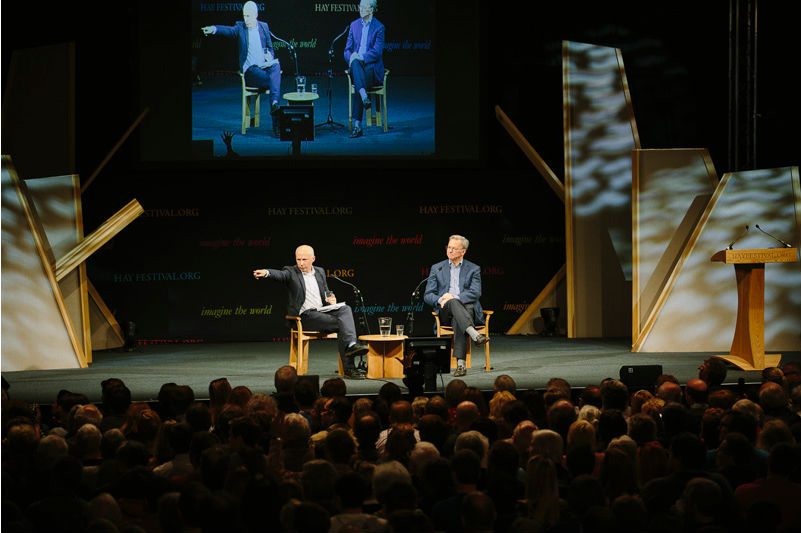 British author and historian Guy Walters (pictured at left) just ran a piece in the UK Literary Review about his less than totally positive experience at the Hay Festival. After a triumphant reading in front of an estimated 800 people, he recounts, he asked for expenses to cover his trip to and from the Festival—and was refused.
British author and historian Guy Walters (pictured at left) just ran a piece in the UK Literary Review about his less than totally positive experience at the Hay Festival. After a triumphant reading in front of an estimated 800 people, he recounts, he asked for expenses to cover his trip to and from the Festival—and was refused.
“As I drove home, I did some maths,” Walters states. “Those eight hundred people had each paid £7 [$10.57], earning Hay a tidy £5,600 [$8,455]. Compared to Hay’s turnover of £4 million [$6 million] and gross profit of £1 million [$1.5 million], that’s not a huge sum, but it is certainly greater than a homeopathic ratio. Hay had probably made around £1,400 [$2,114] from me and I had got, er, six bottles of wine.”
A very very old blog entry from veteran UK author Susan Hill (pictured at right) that I archived from July 2008 lays out the financial situation very neatly. Entitled “A Very Very Nice Little Earner Indeed,” it begins: “Psst. wanna earn a few bob? Then start a Literary Festival. It’s one of the best kept secrets in the world — litfests make a lorra lorra money for those who run them.”
“Here is how it goes. If you own the venue, you’ve a head start since you don’t have to pay hire charges. If you offer accommodation, as a perk to the writers, of course you have pay your cleaning and housekeeping staff a bit more. But after that you’re laughing. But surely, you have to pay your helpers, all those people who run the office, move chairs about and fetch authors from the station. Oh no you don’t, you have students, arts graduates and other people who want to mingle with the Famous Authors. You don’t have to pay them anything, except maybe with a free lunch, because they’re absolutely queuing up to do it, it looks good on their CVs. They would pay YOU for the privilege of helping.”
“Next, you ring and e-mail round all the publishers and ask what Top Names they have on the road flogging a new book. It is the Top Names who are going to make you most of your money. You can charge £15 – £20 [$22.65-$30.00] a head for Sebastian Faulks or Ian McEwan easily and you put them in the Main Hall. That holds 500, with 50 standee students at a fiver each, at the back.”
And that’s just the start. Publishers to cover almost every expense, and provide scads of free books; Arts Council support for everything from marketing and promotional expenses to renovation and venue expansion; catering with handsome markups—and after some years, if it runs well, a heavily invested franchise that can be marketed nationally, even worldwide.
The Hay Festivals now run 14 different events internationally. And having supported the Hay Festival Budapest as a volunteer, I can confirm that the Hay element is very slender, for considerable franchise value.
Walters doesn’t condemn Hay, though:
“They do what any business should do: keep their costs down. If authors are happy to receive cheap wine instead of money, then fair play to Hay. No, I cursed myself, and all the other damn fool authors like me who work for free. Over the past five years, every writer I know has been told by their agent to ‘monetise the activity around their writing’. Give talks. Go to conventions. Judge prizes. Write reviews. Write articles. Go on telly. Go on radio. Go on Twitter. Build your brand. The problem with all these activities is that nobody actually wants to pay you to do them.”
Writers, especially the self-published authors yoked to the self-promotion treadmill, had better remember that. Not least when your litfest hosts may be making every bit as much out of you as Big Publishing ever did.




































Other than Hay, I’d be very interested to know how many (if any) UK literature festivals make any kind of profit. Are most not charitable organisations?
The bi-lingual festival I organise here in France, makes nothing. I accept what your article above is saying but there is a wide gap between Hay and the St Clementin Festival. I wish we had some money. The grant from Europe has been refused. Money within France is difficult. Many of our writers attend, because St Clementin is such a beautiful area. Any idea how we can raise some money? Like to come along, for free of course.
Glyn